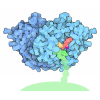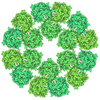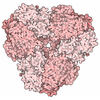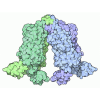+ Open data
Open data
- Basic information
Basic information
| Entry | Database: PDB / ID: 8rf9 | ||||||||||||||||||||||||
|---|---|---|---|---|---|---|---|---|---|---|---|---|---|---|---|---|---|---|---|---|---|---|---|---|---|
| Title | CgsiGP1 sample in nanodisc | ||||||||||||||||||||||||
 Components Components | Cyclic beta 1-2 glucan synthetase | ||||||||||||||||||||||||
 Keywords Keywords | ANTIBIOTIC / cgs / cyclic glucan | ||||||||||||||||||||||||
| Function / homology |  Function and homology information Function and homology informationcellobiose phosphorylase / cellobiose phosphorylase activity / carbohydrate binding / carbohydrate metabolic process / membrane Similarity search - Function | ||||||||||||||||||||||||
| Biological species |  Agrobacterium tumefaciens (bacteria) Agrobacterium tumefaciens (bacteria) | ||||||||||||||||||||||||
| Method | ELECTRON MICROSCOPY / single particle reconstruction / cryo EM / Resolution: 3.28 Å | ||||||||||||||||||||||||
 Authors Authors | Sedzicki, J. / Ni, D. / Lehmann, F. / Stahlberg, H. / Dehio, C. | ||||||||||||||||||||||||
| Funding support |  Switzerland, 4items Switzerland, 4items
| ||||||||||||||||||||||||
 Citation Citation |  Journal: Nat Commun / Year: 2024 Journal: Nat Commun / Year: 2024Title: Structure-function analysis of the cyclic β-1,2-glucan synthase from Agrobacterium tumefaciens. Authors: Jaroslaw Sedzicki / Dongchun Ni / Frank Lehmann / Henning Stahlberg / Christoph Dehio /  Abstract: The synthesis of complex sugars is a key aspect of microbial biology. Cyclic β-1,2-glucan (CβG) is a circular polysaccharide critical for host interactions of many bacteria, including major ...The synthesis of complex sugars is a key aspect of microbial biology. Cyclic β-1,2-glucan (CβG) is a circular polysaccharide critical for host interactions of many bacteria, including major pathogens of humans (Brucella) and plants (Agrobacterium). CβG is produced by the cyclic glucan synthase (Cgs), a multi-domain membrane protein. So far, its structure as well as the mechanism underlining the synthesis have not been clarified. Here we use cryo-electron microscopy (cryo-EM) and functional approaches to study Cgs from A. tumefaciens. We determine the structure of this complex protein machinery and clarify key aspects of CβG synthesis, revealing a distinct mechanism that uses a tyrosine-linked oligosaccharide intermediate in cycles of polymerization and processing of the glucan chain. Our research opens possibilities for combating pathogens that rely on polysaccharide virulence factors and may lead to synthetic biology approaches for producing complex cyclic sugars. #1:  Journal: Nat Commun / Year: 2024 Journal: Nat Commun / Year: 2024Title: Structure-function analysis of the cyclic β-1,2-glucan synthase from Agrobacterium tumefaciens. Authors: Jaroslaw Sedzicki / Dongchun Ni / Frank Lehmann / Henning Stahlberg / Christoph Dehio /  Abstract: The synthesis of complex sugars is a key aspect of microbial biology. Cyclic β-1,2-glucan (CβG) is a circular polysaccharide critical for host interactions of many bacteria, including major ...The synthesis of complex sugars is a key aspect of microbial biology. Cyclic β-1,2-glucan (CβG) is a circular polysaccharide critical for host interactions of many bacteria, including major pathogens of humans (Brucella) and plants (Agrobacterium). CβG is produced by the cyclic glucan synthase (Cgs), a multi-domain membrane protein. So far, its structure as well as the mechanism underlining the synthesis have not been clarified. Here we use cryo-electron microscopy (cryo-EM) and functional approaches to study Cgs from A. tumefaciens. We determine the structure of this complex protein machinery and clarify key aspects of CβG synthesis, revealing a distinct mechanism that uses a tyrosine-linked oligosaccharide intermediate in cycles of polymerization and processing of the glucan chain. Our research opens possibilities for combating pathogens that rely on polysaccharide virulence factors and may lead to synthetic biology approaches for producing complex cyclic sugars. | ||||||||||||||||||||||||
| History |
|
- Structure visualization
Structure visualization
| Structure viewer | Molecule:  Molmil Molmil Jmol/JSmol Jmol/JSmol |
|---|
- Downloads & links
Downloads & links
- Download
Download
| PDBx/mmCIF format |  8rf9.cif.gz 8rf9.cif.gz | 472.7 KB | Display |  PDBx/mmCIF format PDBx/mmCIF format |
|---|---|---|---|---|
| PDB format |  pdb8rf9.ent.gz pdb8rf9.ent.gz | 373.6 KB | Display |  PDB format PDB format |
| PDBx/mmJSON format |  8rf9.json.gz 8rf9.json.gz | Tree view |  PDBx/mmJSON format PDBx/mmJSON format | |
| Others |  Other downloads Other downloads |
-Validation report
| Summary document |  8rf9_validation.pdf.gz 8rf9_validation.pdf.gz | 1.4 MB | Display |  wwPDB validaton report wwPDB validaton report |
|---|---|---|---|---|
| Full document |  8rf9_full_validation.pdf.gz 8rf9_full_validation.pdf.gz | 1.4 MB | Display | |
| Data in XML |  8rf9_validation.xml.gz 8rf9_validation.xml.gz | 82 KB | Display | |
| Data in CIF |  8rf9_validation.cif.gz 8rf9_validation.cif.gz | 124 KB | Display | |
| Arichive directory |  https://data.pdbj.org/pub/pdb/validation_reports/rf/8rf9 https://data.pdbj.org/pub/pdb/validation_reports/rf/8rf9 ftp://data.pdbj.org/pub/pdb/validation_reports/rf/8rf9 ftp://data.pdbj.org/pub/pdb/validation_reports/rf/8rf9 | HTTPS FTP |
-Related structure data
| Related structure data |  19116MC 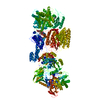 8rf0C  8rfeC 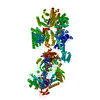 8rfgC M: map data used to model this data C: citing same article ( |
|---|---|
| Similar structure data | Similarity search - Function & homology  F&H Search F&H Search |
- Links
Links
- Assembly
Assembly
| Deposited unit | 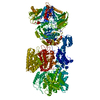
|
|---|---|
| 1 |
|
- Components
Components
| #1: Protein | Mass: 313358.656 Da / Num. of mol.: 1 / Source method: isolated from a natural source / Source: (natural)  Agrobacterium tumefaciens (bacteria) / References: UniProt: A0A0F4FQW4, cellobiose phosphorylase Agrobacterium tumefaciens (bacteria) / References: UniProt: A0A0F4FQW4, cellobiose phosphorylase |
|---|---|
| Has ligand of interest | Y |
| Has protein modification | N |
-Experimental details
-Experiment
| Experiment | Method: ELECTRON MICROSCOPY |
|---|---|
| EM experiment | Aggregation state: PARTICLE / 3D reconstruction method: single particle reconstruction |
- Sample preparation
Sample preparation
| Component | Name: cyclic b-1,2-glucan synthase from Agrobacterium tumefaciens Type: COMPLEX / Entity ID: all / Source: NATURAL |
|---|---|
| Source (natural) | Organism:  Agrobacterium tumefaciens (bacteria) Agrobacterium tumefaciens (bacteria) |
| Buffer solution | pH: 8 |
| Specimen | Embedding applied: NO / Shadowing applied: NO / Staining applied: NO / Vitrification applied: YES |
| Vitrification | Cryogen name: ETHANE |
- Electron microscopy imaging
Electron microscopy imaging
| Experimental equipment |  Model: Titan Krios / Image courtesy: FEI Company |
|---|---|
| Microscopy | Model: FEI TITAN KRIOS |
| Electron gun | Electron source:  FIELD EMISSION GUN / Accelerating voltage: 300 kV / Illumination mode: FLOOD BEAM FIELD EMISSION GUN / Accelerating voltage: 300 kV / Illumination mode: FLOOD BEAM |
| Electron lens | Mode: OTHER / Nominal defocus max: 2500 nm / Nominal defocus min: 1200 nm |
| Image recording | Electron dose: 60 e/Å2 / Film or detector model: FEI FALCON IV (4k x 4k) |
- Processing
Processing
| EM software | Name: PHENIX / Category: model refinement | ||||||||||||||||||||||||
|---|---|---|---|---|---|---|---|---|---|---|---|---|---|---|---|---|---|---|---|---|---|---|---|---|---|
| CTF correction | Type: NONE | ||||||||||||||||||||||||
| 3D reconstruction | Resolution: 3.28 Å / Resolution method: FSC 0.143 CUT-OFF / Num. of particles: 46665 / Algorithm: BACK PROJECTION / Symmetry type: POINT | ||||||||||||||||||||||||
| Refine LS restraints |
|
 Movie
Movie Controller
Controller







 PDBj
PDBj

